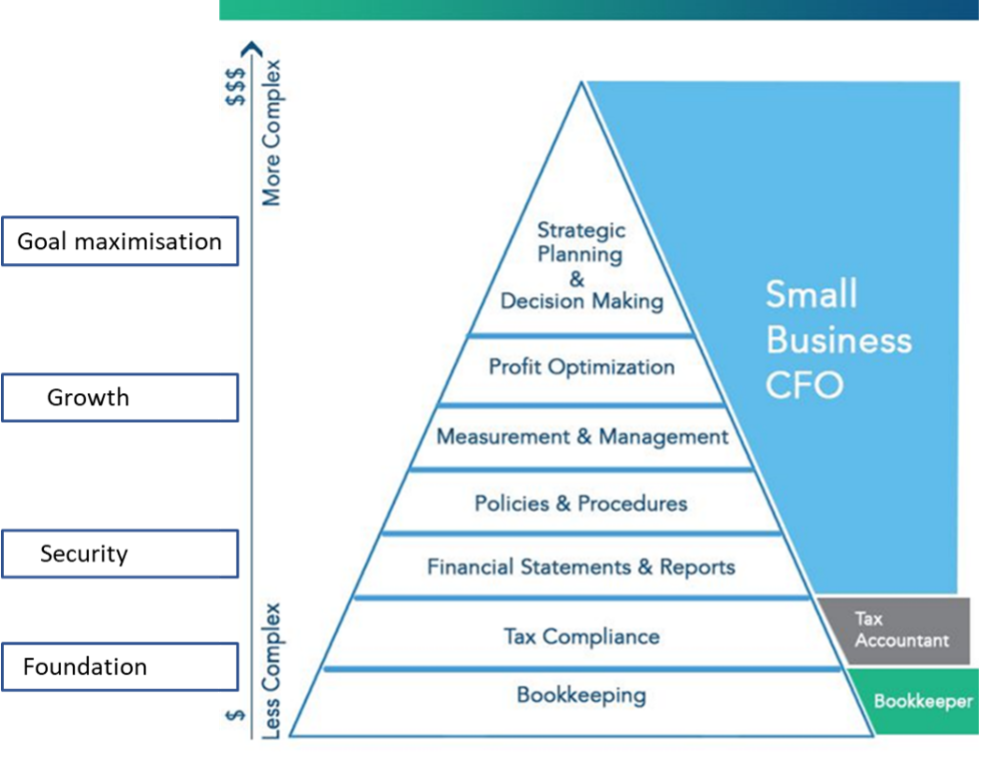A Hierarchy of Needs
The financial requirements of a company will inevitably change over time and throughout the lifecycle of the business. We’re going to borrow the concept of Maslow’s Hierarchy of Needs to model how these requirements evolve. First published in 1943, Maslow’s Hierarchy of Needs is a motivational theory in psychology comprising a five-tier model of human needs, often depicted as hierarchical levels within a pyramid. Needs lower down in the hierarchy must be satisfied before the needs higher up the pyramid can be attended to.
A similarly structured Hierarchy of Needs could be used to examine the financial management of a business, with the different stages of a business’ development divided into four main categories (Foundation, Security, Growth, and Goal Maximization), as displayed in the figure below:

Foundation
The more basic the needs, the more basic the skills required to perform them. In financial terms, the fundamental needs of a business are administrative and can be met with a bit of technical training. Invoices need to be processed and paid, and bookkeeping taken care of. Generally speaking, businesses that are at this level in the Hierarchy of Needs can manage well without a CFO, by outsourcing to a firm or relying on a junior staff member to take care of the essentials.
Security
As a business grows, its needs also evolve in complexity. Once a company starts requiring things like financial statements and reports, the presence of a CFO becomes more useful. Financial and cash planning is particularly essential for a biotech start-up, and is best done in-house so that forecasts can be quickly and accurately amended as the business evolves. A meaningful rolling forecast requires the skills of somebody who not only understands financial modelling but also understands the underlying business. At this stage a full-time CFO may exceed the requirements of a company, so many biotechs compromise by opting for a part-time CFO who divides their time between several companies, obtaining the required expertise without the outlay for a full-time CFO.
Growth
To support growth, it’s essential for a business to have a person onboard who can accurately measure financials and understand the nuances of its performance, adapting the company’s course of action accordingly. In a biotech company, this means having a firm grasp not only on how much is being spent where, but also on market analyses, the cost/benefit analysis of spending more to accelerate progress, and knowing when to discontinue projects or programs that no longer make economic sense. At this stage, finances become more than just a measuring device – they’re a tool enabling company management. It’s now essential for a company to have a qualified CFO onboard who can make use of tools like key performance indicators (KPIs) to help guide the business and ensure that the right strategies are in place to achieve crucial goals.
Goal Maximization
Once a business reaches the top of the pyramid, the CFO starts providing their CEO with more than just financial expertise – the CFO now acts more as a counterpart in decision making, providing counsel and support. The CFO can provide strategic insights based on the plans, forecasts, and tools that have been developed and customized for the business. Their views are invaluable when considering important questions like: “Should we partner a program?”; “How much funding should we raise and how?”; or “How do we plan for an exit?”. The CFO will help ensure everything is in place to facilitate successful due diligence, whether for funding, M&A activity, or for an IPO. Because building fruitful relationships with potential partners, bankers, and investors takes time, it is imperative that a CFO is onboard and well-integrated into the company before tackling any of these long-term goals.
Moving up the pyramid
Before hiring a CFO, the CEO and the Board need to ask themselves whether they would like to have a CFO present to aid in the company’s journey up the pyramid, or if it’s best to wait until the need arises for a CFO’s particular skillset. As Maslow’s original theory argued, needs lower down the pyramid must be satisfied before you can progress to the next level. Hiring above your needs, by bringing a CFO on board earlier than strictly necessary, may result in more effective and smooth business development. Biotech companies are always in a race, aiming to achieve scientific and clinical results as quickly as possible. An experienced CFO will help to ensure that the company is in the best possible position to get ahead in this race.


